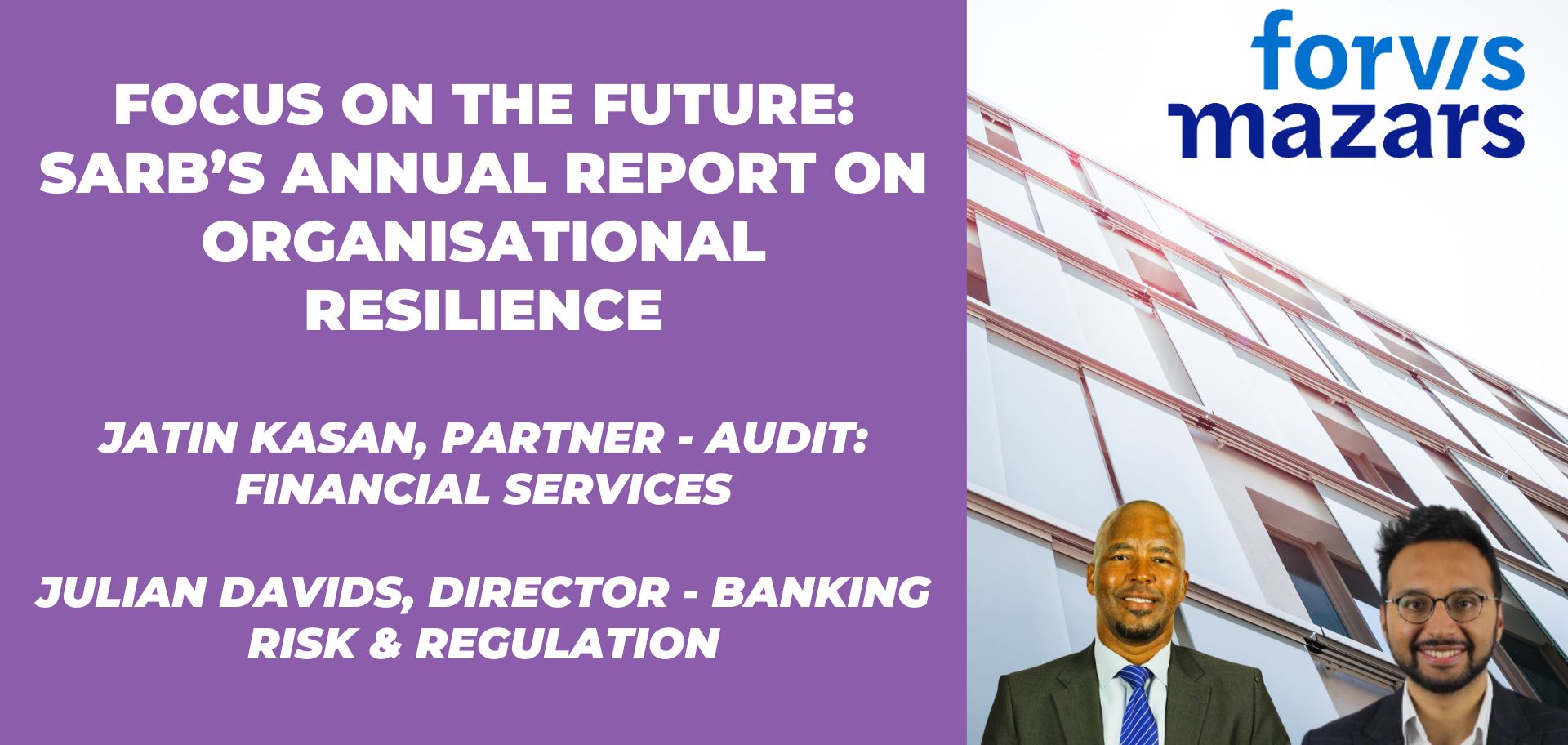Within the banking sector, organisational resilience is becoming increasingly critical in South Africa, as highlighted in the SARB’s Annual Report.
The concept of organisational resilience encompasses a bank’s ability to withstand and adapt to internal and external disruptions while maintaining essential functions and safeguarding its reputation and long-term sustainability.
Moreover, the resilience of banks in South Africa is also being tested by regulatory changes, technological advancements, and shifts in consumer expectations towards ethical and transparent banking practices. As such, integrating organisational resilience into risk management frameworks becomes crucial for maintaining stability and competitiveness in the market. Banks that effectively navigate these challenges are better positioned to attract responsible investors, meet regulatory requirements, and build long-term value for shareholders and society.
These key trends align with the recently released report of the South African Reserve Bank (SARB) which highlighted focus areas for the coming year. As in previous years, the report issued by the Prudential Authority, the supervisory division of SARB, offers critical insights into the regulatory landscape.
It is crucial to dissect and understand this particular focus area, not only from the regulator’s perspective but also through the lens of our clients’ experiences.
From our interactions with clients, it is evident that many banks have been “thrown into the deep end” when dealing with sudden changes. These institutions often require substantial support to navigate these turbulent waters. The SARB’s feedback serves as both a warning and a guide, urging banks to adhere and to be ready for regulatory changes, to prioritise resilience and be prepared.
Our viewpoint aligns with this stance. We have observed that larger banks tend to have more sophisticated resilience mechanisms, while small to medium-sized banks often struggle with resource constraints. It is imperative for these smaller institutions to leverage technology and strategic partnerships to build their resilience. The role of foreign banks also cannot be ignored, although more reliance is placed at a group level, as they bring diverse perspectives and practices that can enhance local resilience strategies.
Our Banking team has been actively working with clients to navigate these complexities. We have found that banks that are forward looking proactively adopt organisational resilience practices often see long-term benefits, including improved risk management strategies, adherence to regulatory policies and procedures and enhanced reputation. However, the journey towards resilience is fraught with challenges, including the need for accurate, relevant and quality data, robust risk assessment models, and clear reporting standards.
While larger banks have well defined oversight structures, covering certain aspects of risk within the organisation, the challenge however remains to enhance organisational reliance by adequately mapping the interconnectedness and interdependencies with third party service providers. It is imperative that banks partner with service providers that have the capabilities and resources to assist with gathering quality and relative data used to inform principles, policies and procedures around organisational resilience.
Vulnerability of mutual banks
The Report highlights several critical concerns regarding mutual banks. It notes that many of these institutions fail to address organisational resilience in a comprehensive manner, leaving them vulnerable in various aspects of their operations. A significant issue identified is the inadequate management of third parties and supply chain risks. The resilience capabilities of these external partners are often not sufficiently integrated into their contractual agreements, leading to potential vulnerabilities.
Additionally, the report points out that mutual banks are lacking in their coverage of concentration risk, which could expose them to significant financial instability if not properly managed.
Market insight emphasised the need for continuous support and guidance. They noted that while the SARB’s report provides strategic direction, banks often require more detailed, practical advice to implement these strategies effectively. This underscores the importance of collaboration between regulators, banks, and advisory firms like ourselves.
As we move forward, commitment should be to helping banks interpret and implement the SARB’s recommendations.
The SARB’s 2023/24 report on organisational resilience provides a roadmap for banks to navigate the evolving regulatory landscape. By integrating resilience into their core operations, banks can better manage risks and contribute to a more resilient future. We are not only here to support our clients but we also challenge them every step of the way, helping them turn regulatory challenges into opportunities for growth and improvement.
Connect with Jatin Kasan on LinkedIn
Connect with Julian Davids on LinkedIn



